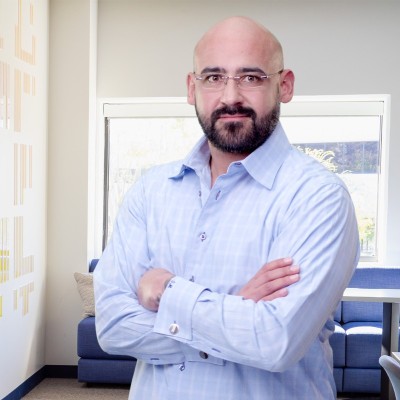To the Class of 2025: What AI-Proof Majors Look Like
Worried about choosing a college major in the age of AI? Discover which degrees and skills will lead to resilient, high-opportunity careers.


Recently, while accompanying my nephew on college tours, we delved into a question that every 17-year-old and their family seems to be asking: What should I study in college so I don’t end up irrelevant in the age of AI?
People are often surprised when I tell them: Modeling your future after my career path is a bad idea. What got me here wasn’t a perfect plan—it was judgment, wisdom, self-doubt, and the unique mix of experiences that only I lived through. And crucially, those things—the ones AI can’t replicate—are what got me here. You can’t teach or fake “judgment” in a bootcamp or semester-long course. It’s built over time.
And that’s exactly why this moment is so hard for new grads: They're being asked to bet on a future that doesn't exist yet, using advice from a system (college) and adults (us) who aren’t always equipped for what's coming next.
The AI Landscape: Disruption and Opportunity
Artificial intelligence is already changing the job market—and fast. According to the World Economic Forum, AI and automation are expected to displace 85 million jobs by 2025, while also creating 97 million new ones in fields like data analysis, cybersecurity, and human-AI collaboration. That’s a net gain—but only for those who adapt quickly.
In the US, approximately 2.1 million workers are projected to be displaced by automation in 2025 alone, especially in jobs like customer service, bookkeeping, and data entry. Yet, job postings for AI-related roles have grown 3.5X faster than average since 2016—and these often command higher salaries.
So how do you pick a major when the ground is shifting beneath your feet?
What to Study: Majors Poised for Success in the Age of AI
The best college majors today are those that lean into what AI can’t do: touch, feel, judge, empathize, improvise. They rely on timeless human skills like wisdom, ethics, creativity, and connection—while also leaving room to work with AI, not against it.
Let’s break it down.
Healthcare Professions: Where Empathy Meets Expertise
Healthcare isn’t just about diagnostics—it’s about people. AI can analyze bloodwork, but it can’t build trust with a nervous patient. It can summarize symptoms, but it can’t guide someone through grief. That’s where human caregivers shine.
Why It Matters:
The US Bureau of Labor Statistics projects that healthcare and social assistance will add about 2.1 million jobs from 2022–2032, more than any other sector, accounting for 45% of all new jobs.
AI-proof factors:
- High-touch, interpersonal care
- Ethical and legal constraints on automation
- Growing demand from aging populations
New Perspective:
AI is already changing healthcare—from robotic surgery to diagnostic assistants—but that doesn’t make doctors and nurses obsolete. In fact, it makes them more effective. The smartest practitioners of the future won’t ignore AI—they’ll know how to work alongside it. Learn AI tools, but never forget: AI can’t look at a patient and understand what the unspoken, non-quantifiable symptoms and expressions are saying. You can.
Education & Human Services: Teaching Each Other
Teaching isn’t just content delivery. It’s classroom management, emotional education, mentorship, curriculum adaptation, and human connection. Likewise, fields like social work, counseling, and child development depend on understanding subtle social and psychological cues that AI still struggles with immensely.
Why It Matters:
UNESCO estimates we need to recruit 68.8 million teachers by 2030 to meet global education goals.
AI-proof factors:
- Contextual adaptation to student needs
- Emotional intelligence and mentorship
- Accountability and trust (which machines can’t offer)
New Perspective:
I still pay a human chess coach—even though I have a chess AI that can watch YouTube videos and explain moves. Why? Accountability. My coach notices why I’m not improving. A good teacher helps you grow.
I also want to point out that we assume colleges and teachers will prepare students for the future. But many educators are going through the same disruption students are. They’re facing questions they weren’t trained to answer. That’s why empathy—for them—is critical.
And students are changing, too. My nephew vibe-coded a Spanish language app when the school software crashed. Ten years ago, they would’ve watched a movie for class that day. Today? Students and teachers are co-creators. We’re heading toward an educational model closer to Socratic dialogue than sage-on-a-stage. Students shouldn’t wait for professors to “teach them everything,” but also need the humility to recognize what they don’t know.
Skilled Trades: The Last Frontier of Automation
AI can code and draft contracts. But it still can’t rewire a house, fix a burst pipe, or climb on a roof. That’s not changing soon.
Why It Matters:
The US Chamber of Commerce reports that for every ten skilled tradespeople retiring, only five are entering the field. Simultaneously, some trades are seeing rising unemployment due to oversupply, especially in urban markets.
AI-proof factors:
- High variability in physical environments
- Tool use and real-time improvisation
- Real-world spatial awareness and judgment
New Perspective:
Don’t just “go into trades” because someone said so. Ask yourself: What physical skills do I have that are truly hard to replicate? How can I pair that with AI literacy or entrepreneurial savvy? Robots are still clumsy. People are still brilliant with their hands.
Plus, there’s a reason we don’t have self-driving cars on every street yet. It’s not the tech—it’s the humans. It takes decades and billions to roll out hardware. That’s why human plumbers, carpenters, and HVAC pros aren’t going away anytime soon.
Creative Arts & Design: Originality Over Imitation
AI can remix style. But it can’t originate meaning. It doesn’t understand culture, humor, or joy. If all we ever do is generate new things based on what already exists, creativity stagnates—and so does society.
Why It Matters:
UX/UI design jobs are expected to grow 16% by 2032, over 3X the national average.
AI-proof factors:
- Taste, irony, and cultural literacy
- Human-centered storytelling
- Creative intuition and irreverence
New Perspective:
Artists, designers, and writers won’t disappear—they’ll become the editors, prompt engineers, and strategists behind the scenes. AI may be the paintbrush, but you’re still holding the brush.
Interdisciplinary Studies: The Bridge Builders
This is the age of intelligent generalists. But that doesn’t mean “dabble in everything.” It means go deep and wide. It means knowing how your discipline connects to someone else’s.
Why It Matters:
Gartner projects that by 2027, over 70% of enterprises will use industry cloud platforms—driving demand for integrative thinkers and cross-functional collaboration.
AI-proof factors:
- Systems thinking and ambiguity navigation
- Human-in-the-loop design and ethical oversight
- Translation across domains (i.e. Law + Tech; Policy + AI)
New Perspective:
The liberal arts are having a renaissance. Philosophy, long dismissed, is now essential—because ethics, judgment, and ambiguity are at the core of AI supervision. The best entrepreneurs of the future might just be those who majored in philosophy and minored in CS.
Building a Career AI Can’t Replace
AI is confidently incompetent. It doesn’t know what it doesn’t know. Humans, on the other hand, are unconfidently incompetent—which means we doubt, reflect, course-correct, and grow.
Education is no longer a pipeline. It’s a partnership. Teachers are learning. Students are experimenting. And the world needs people who know how to build, care, guide, question, and create—things that AI can’t truly replicate.
So whether you choose healthcare, education, trades, art, or interdisciplinary paths—make sure what you’re building is based on more than trends. Build it on judgment, curiosity, humility, and the timeless skills that make you human.




